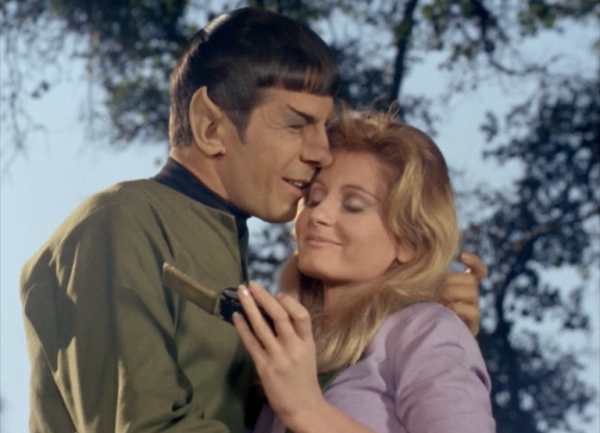What’s that you say? You came here expecting writing tips and instead found me watching a classic Star Trek marathon on BBC America? Yeah. That’s by design. Honest.
Now have a seat. Tonight we’ll be watching May 1967’s “This Side of Paradise,” Episode 24 of Season 1, showcasing the many emotions of Mr. Spock.

Written by F. Scott Fitzgerald?
Spock is that guy there. The one with the ears. And no, he’s not the one who used to be on Heroes. This is Spock as portrayed by the late, great Leonard Nimoy. You know, Nimoy, the guy who sang the Bilbo Baggins theme song at the very end of the last Hobbit movie.
https://www.youtube.com/watch?v=AGF5ROpjRAU
Or so I’ve heard. I only made it through the first two movies.
Anyway, in this episode we see Spock laugh and smile under the influence of mind-warping flower spores.

Happy Spock
We see him rekindle and then painfully extinguish a romantic flame that’s incompatible with his Federation duties.

Affectionate Spock
We see him react with anger and rage at the calculated taunts of his captain.

Rarrr! Spock will smash!!!
And finally, we see Spock back in his usual demeanor as the stoic half-Vulcan whose feelings are just barely leaking through in tiny displays of posture, intonation, and famously raised eyebrows.
It’s an hour-long rollercoaster of emotion…from Mr. Spock! That’s amazing. But the really amazing part is that none of it is out of character, and all of it occurs under the influence of an organism that’s evolved to dampen and suppress the emotions of its hosts.
Just not as well as Spock normally does all on his own.
Nimoy’s Spock seethes with emotion and inner conflict in every scene of every episode of Trek, but we usually only see the internal turmoil through tiny cracks in Spock’s hardened exterior of logic and intellectualism.
Likewise, in our own writing, we don’t always need our characters to be shouting, stomping around, or contorting their faces into unnatural expressions in order to show emotion. Sometimes a single eyebrow can convey all of that and more.

Spock has a secret heart, hidden feelings of self-doubt, and a capped well of deep pain. The hints of emotion that we come to understand over the course of the series are those that emerge despite Spock’s heroic efforts at suppression.
You might compare Spock with Brent Spiner’s Data from Star Trek: The Next Generation, and say that hints of emotion from Data are indications of his potential for personal growth and evolution. These are stable, controlled, apparently emotionless characters whose hidden depths are revealed in layers over time.
These characters aren’t just expressing emotion, but struggling with them and their implications, and that makes them instantly more compelling, complex, interesting, and relatable.
For writers, there is much to learn from Nimoy’s portrayal of Mr. Spock, and especially for me I attempt to write about my own set of alien characters in the Galaxy Games series.
Spock’s emotional journey is an example of what science fiction does best: hold a mirror up to ourselves. In this case, we get to explore the extremes of human emotion from a perspective that would be impossible in more realistic fiction.
Some scientists believe that real-life space aliens would be so emotionally different from us that we could never hope to communicate with them. Even if we shared the same verbal language, our different emotional languages would make understanding impossible. But in fiction, the struggles of Mr. Spock and other non-human characters allow readers to better understand what it means to be human.
Now pass me the chips. There’s another episode starting up!
Greg R. Fishbone is the author of the Galaxy Games series of sporty science fiction for young readers. His latest book, The Amorphous Assassin, drops this month in paperback and ebook formats and is available from all your favorite booksellers. His website is located at gfishbone.com




